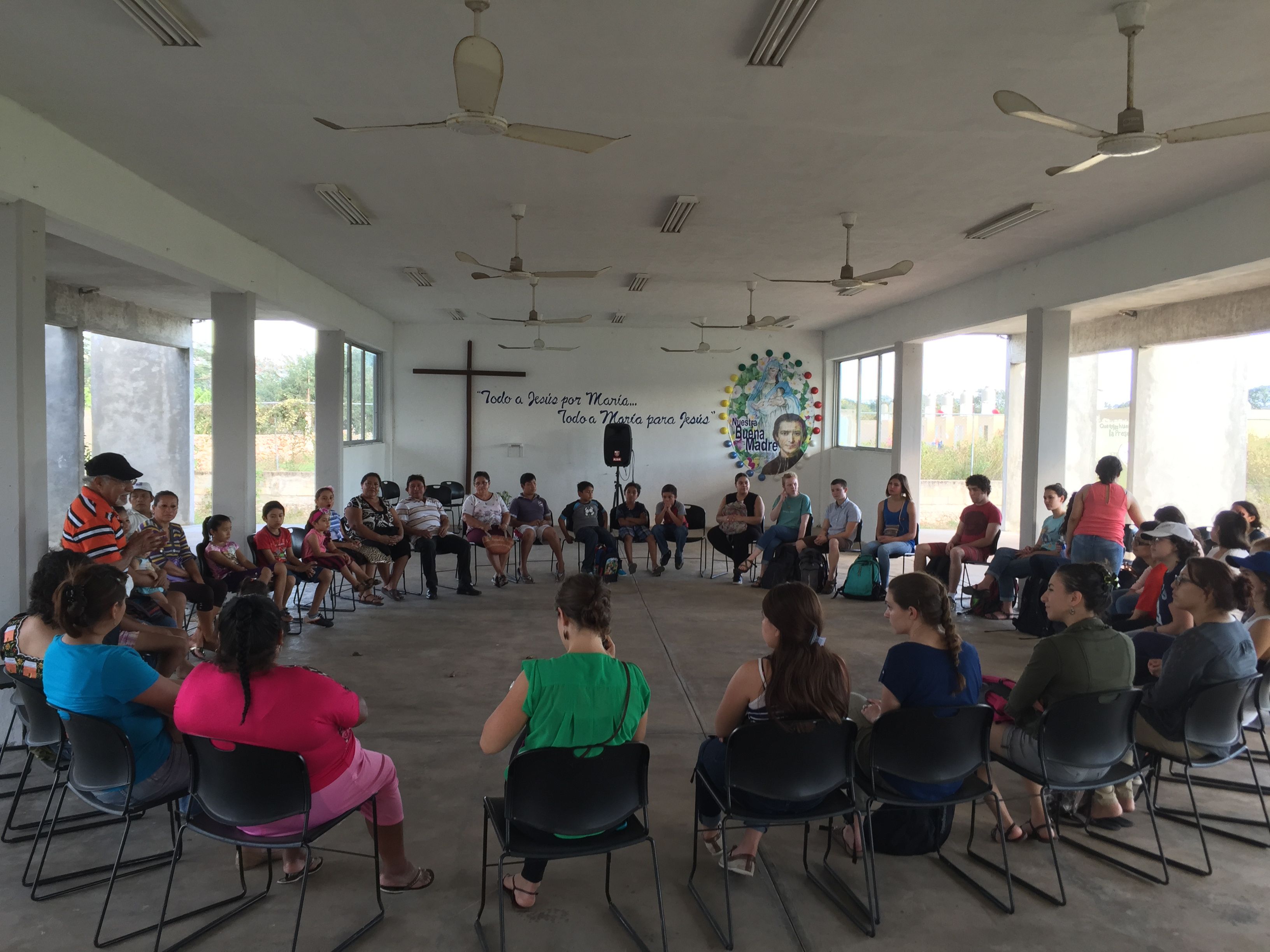 DePaul students and Emiliano Zapata Sur residents continue a 12-year partnership in Mexico
DePaul students and Emiliano Zapata Sur residents continue a 12-year partnership in Mexico
Three years ago, DePaul alum Daniel Alanis spent six months
in Mérida, Mexico studying
Spanish, taking courses, and engaging with families in the neighborhood of
Emiliano Zapata Sur (EZS). Mérida,
also known as the Maya town of T’ho, is the commercial and cultural capital of
the Yucatan Peninsula. Spanish conquistadores destroyed the city in 1542 and
built on top of the ruins, naming the new town Mérida after the one in Spain. While the first language of
most present-day residents is Spanish, the city still has the highest percentage of
indigenous Mayan speakers in Mexico. EZS is primarily
inhabited by Mayan-speaking migrants from Yucatan towns and villages. The
tightly knit nature of the community they form, especially among the women who
hosted Daniel’s community-based experience, had a life-changing impact
on him.
“It’s hard to imagine what kind of path I’d have if I hadn’t
gone there,” says Alanis. “It was like a fork in the road. I think of things ‘before
and after Mérida’.” Like many DePaul students who go on the program, the
experience taught him Spanish and about community engagement and social issues
in Mexico, but he also learned about the incredible assets created by residents
of EZS and especially about how they build community. For the past 12 years, the
Steans Center has partnered with Manos Unidas por el Sur de Mérida, a grassroots community organization
developed and run by women in EZS as a means to support their children and families.
Daniel represents a long line of students who have spent all or part of January
to June working on projects defined by Manos Unidas that are integrated with DePaul Community Service Studies courses. During the program, students engage in
numerous projects including garden work, tutoring, educational, technology and
social media workshops, research, and conversations with youth on Mayan
identity and language. In recent years, the work has centered around four community-based technology centers, Casas Digitales, developed by the women of Manos Unidas to provide computer access for youth. The computers are like magnets for young people who end up involving themselves in a variety of community programs supported by the organization. Because of such efforts, Manos Unidas was recently given official NGO status by the Mexican government.
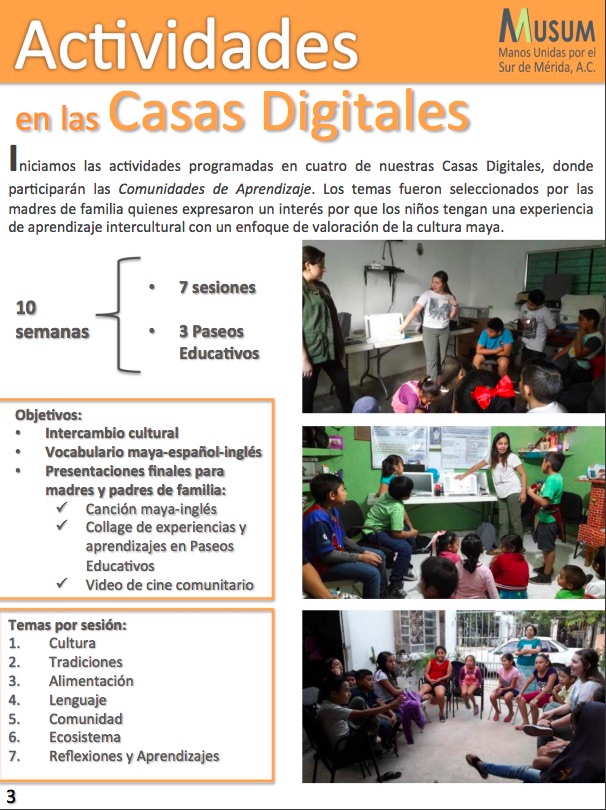 Manos Unidas Monthly Newsletter illustrating 2017 students leading workshops at the Cases Digitales of Manos Unidas. Boletín Musum Enero 2017 https://issuu.com/musum/docs/boleti__n_musum-enero_2017
Manos Unidas Monthly Newsletter illustrating 2017 students leading workshops at the Cases Digitales of Manos Unidas. Boletín Musum Enero 2017 https://issuu.com/musum/docs/boleti__n_musum-enero_2017
The Merida program is a collaboration between DePaul’s Study Abroad
office, the College of Liberal Arts and Social Science, the Department of Modern Languages, and the Steans Center. Each year
during Winter term (January to March), students are placed in homestays, study
Spanish at Universidad Autonoma de
Yucatán, take a relevant course from a DePaul faculty member in residence, and study Critical Community Engagement, the introductory course in the Community Service Studies minor, taught by faculty member
from Universidad Marista, a small Catholic university in suburban Merida. The
core assignment of that course is to spend at least one day per week working on projects
in EZS with Manos Unidas. During the Spring term (April to June) the program
offers students the option to stay in Mérida
to study Spanish and engage in a paid internship at a local NGO. The Spring course
and program focus a critical lens on the role of nongovernmental organizations (NGOs) and
allow students to explore the complexities of working at the community
level in the field of international development.
Arturo Caballero, the program’s service learning coordinator
for much of the past 12 years, says “service learning is an excellent
pedagogical approach. It’s experiential learning with interaction between
different cultures. It is reflection and action. And it is a learning community
of families, students and teachers.” Caballero capped off his tenure as service learning coordinator by co-authoring a book chapter with the former Associate Director of the Steans Center, Marisol Morales, about the theoretical underpinnings of the program in Asset-based Community Development and Integral Human Development. The concepts they outline are certainly reflected in the
experience of students like Alanis. “I came out of the experience virtually
fluent in Spanish, and had a very different experience working with mothers and
kids than I thought I would,” he notes. Alanis says that while the families he
encountered live simply, he learned about their considerable assets that go
beyond material wealth. “The people you are working with already have a lot of
what they need. Obviously, there are issues with people living in poverty, but
this is an extremely tight knit community. There was an element of community
I’ve never seen in America.”
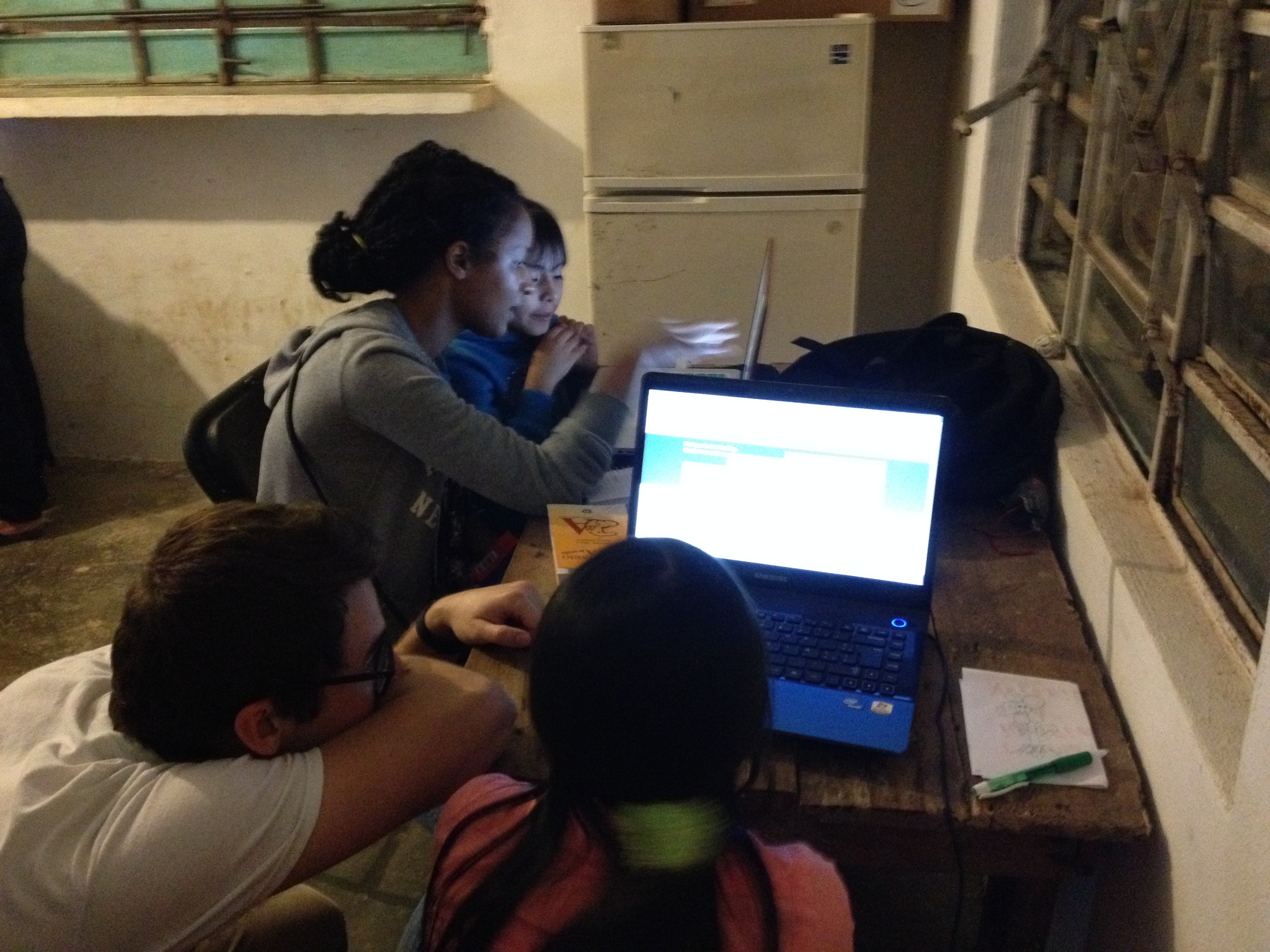 Daniel Alanis works with youth at Manos Unidas - Winter 2014
Daniel Alanis works with youth at Manos Unidas - Winter 2014
Howard Rosing, Executive Director of the Steans Center, notes
that the program “has developed along with the community in EZS. Students
can have a rich and meaningful learning experience – an experience that deeply connects
them with the community and especially the women and children. They see firsthand
the resiliency of communities that face challenging living conditions and how women
in the community have organized to resist such conditions. They see how people
organize to create assets – from a group of women informally organizing to
support families over a decade ago to today where Manos Unidas is a legally recognized NGO supporting sustained programming for youth and adults. And DePaul
students have contributed to and learned from that process the whole way.”
The long-term partnership between DePaul and residents of
EZS is meaningful for both students and residents. Erica Spilde, former program
manager for program, explains how the program fosters lasting memories and
connections for both the community members and for the students. During one of Spilde’s
visits to Mérida she recalls, “I
had a good opportunity to chat with a woman who is a leader in the community.
She got out a photo album and pointed out DePaul students she knew seven years
ago. There were pictures of students with community members. She remembered
names, and some of these students had come back to visit.”
The sentiment that DePaul students are positively
influencing the community in EZS is widespread among the women of Manos Unidas.
They repeatedly talk about the importance of their children being exposed to “cultural
differences” through the program and how it builds the confidence of youth when
they go to school. Elena Espinosa May, the Director of Manos Unidas, remembers how when the
students leave everyone says, “I’m not going to cry, I’m not going to cry.” And
then “the tears come streaming down, and they say, ‘I’m not going to cry!’ and
I say to myself, ‘I’m not going to cry, because you’ll come back.’ Yet the impact
of the students, according to Espinosa May, is more than emotional. She notes, "first I
said to the boy who came from DePaul, ‘they look up to you as role models.’ [They
say] ‘When I’m big, I’m going to be like this one, like that one,’” Most
importantly, she notes, because of the DePaul students “they [neighborhood youth]
all want to get in line to walk into class [school]. There’s a big difference.”
This is real-life engagement, it isn’t scripted. It allows students to engage authentically on an everyday level.
That the relationship between DePaul students and EZS residents
is mutually beneficial is not surprising to Jacqueline Lazú, Associate Dean in the College of Liberal Arts and Social
Sciences which oversees the Mérida
curriculum. Lazú, who is also an
Associate Professor in Modern Languages and used to direct the Community
Service Studies program, says “This is real-life engagement, it isn’t scripted.
It allows students to engage authentically on an everyday level.”
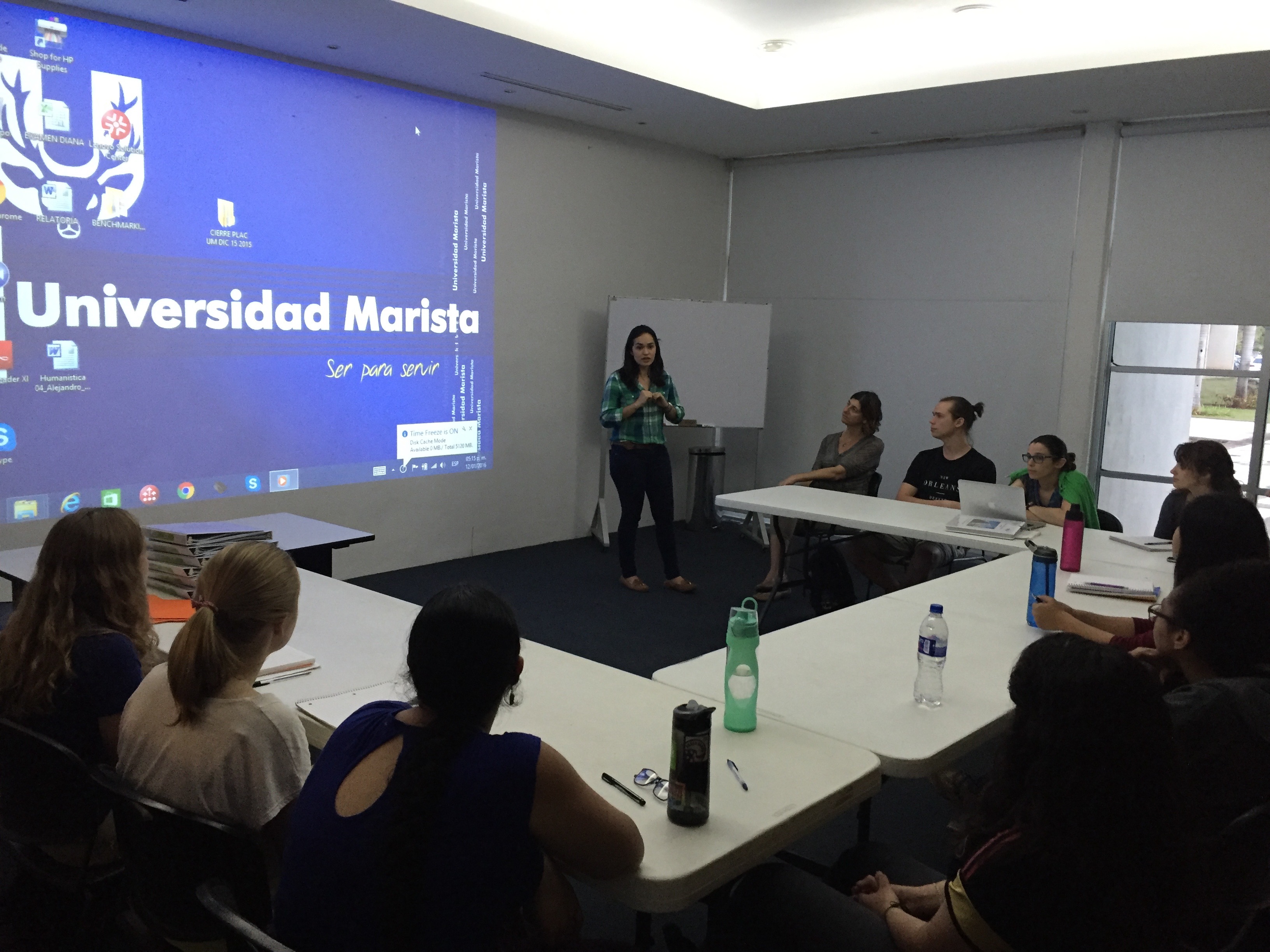 DePaul students study Critical Community Engagement at Universidad Marista
DePaul students study Critical Community Engagement at Universidad Marista
The importance of the cultural exchange in the Mérida program is apparent to Nila Ginger
Hofman, Professor of Anthropology and Faculty Director of Community Service
Studies. She participated in the Merida Program in 2011 as a faculty member in
residence. During her stay, she taught a course on the anthropology of gender
that guided students toward more deeply understanding the gendered nature of
community life in Mérida and
EZS. This meant guiding students to understand ethnographically how people place meaning
on the world around them, including the women in EZS. “International educational partnerships of this type offer the quintessential form experiential learning for both students and community members. They illuminate the connection between global issues and everyday lived experience," says Hofman.
As Rosing states, "The success of DePaul’s approach to international community engagement rests on the act of listening to community members and forgetting for a moment about our own interests.” From the beginning of the relationship with Manos Unidas, Steans Center staff have
visited EZS annually to work with local coordinators to engage in listening to
what the women in the community want students to work on. Rosing and others still
visit every year to meet with local coordinators such as Claudia Chapa Cortes,
who manages the logistics of the study abroad program for DePaul in Mérida. From
her vantage point, she notes, “DePaul has a very distinctive approach in terms
of service learning. Many universities are looking for a volunteer-type situation.
But with the Steans Center, it is based on the assets of the community. The
community learns from students and students learn from the community. It’s not
like giving aid to the community.”
Professor Jaqueline Tapia Chavez of Universidad Marista, who
currently teaches Critical Community Engagement for DePaul sees firsthand how the students learn from their engagement. “I teach them the theoretical framework of this subject, and then the next day
they are in the community. In the end, students are more open to their
experience and are more tolerant of other perspectives. They understand pretty
well that learning doesn’t just happen at the end [of the experience]. It
happens during the whole process.” That learning process continues after the program ends. DePaul
alum Adam Penney, who graduated with a B.S. in Environmental Studies and a
minor in Spanish, studied in Merida in 2015. During the Spring term, Penney
spent four days a week teaching computer literacy to community members. “It was
humbling,” he says. “I benefited from the chance to build relationships with
people from different backgrounds and being in a new space. Being out of my
comfort zone let me see things in a different way.” He adds that the experience
changed the way he saw service. “It can be frustrating and complicated, and it
requires a lot of patience.” Now, as an urban agriculture instructor at Gary
Comer Youth Center on Chicago’s south side, he says his approach to his job
reflects what he learned in Merida. “I make fewer assumptions than I would have
before going to Mérida,” he says.
“I’ve learned how to work with people in a group who have different levels of
literacy and skill.”
It helped me realize a lot of practical things about how grassroots groups are run, who makes the decisions and how they work to engage communities.
For Kayla Walker, who majored in Peace, Justice and Conflict
studies, studying in Mérida enhanced
her understanding of nonprofit organizations. “It helped me realize a lot of
practical things about how grassroots groups are run, who makes the decisions
and how they work to engage communities.” As an intern during the Spring 2016
program, she worked on a manual on how nonprofits can create a volunteer infrastructure
for an organization that helps smaller groups such as Manos Unidas gain
administrative skills. Through the experience, she gained a more nuanced
understanding of how NGOs operate in Latin America both in terms of their
strengths as well as the barriers they create to social change.
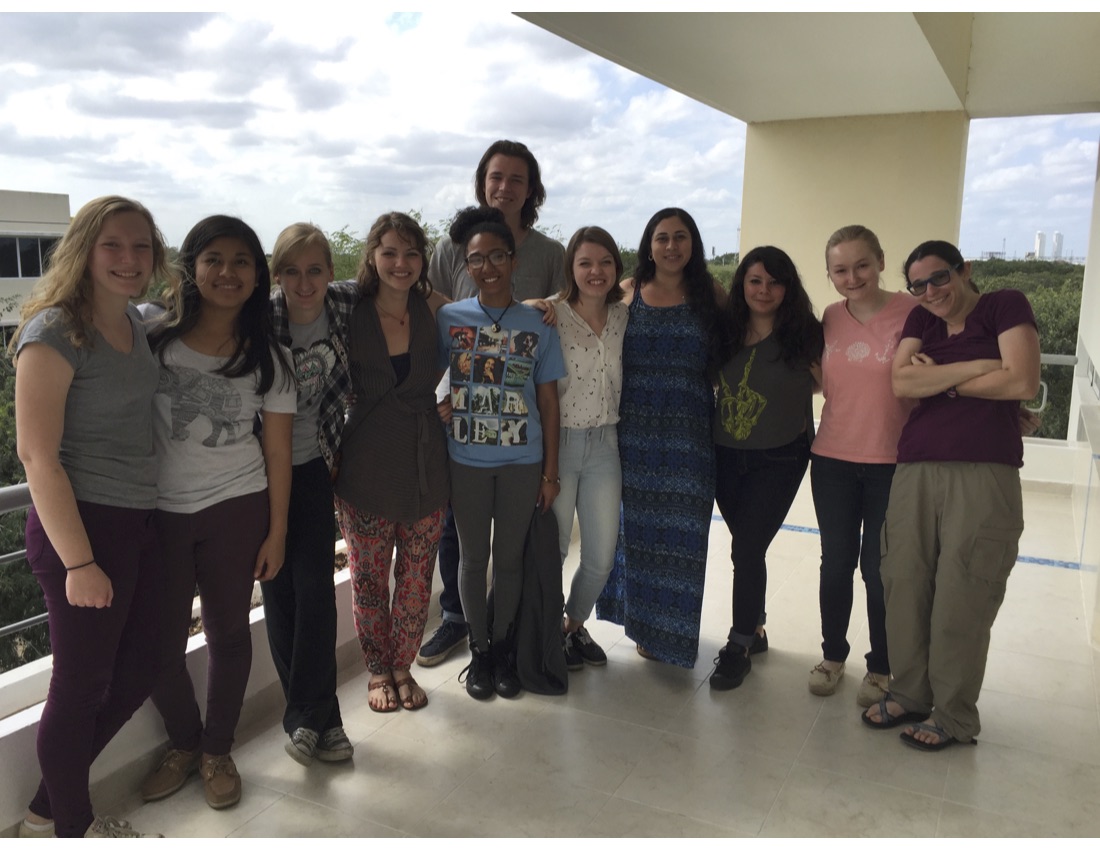 Kayla Walker, Morgan Krause and the 2016 Merida Program students
Kayla Walker, Morgan Krause and the 2016 Merida Program students
Morgan Krause, an anthropology and Spanish major was part of
the cohort with Walker. She remembers a service learning experience when she
and other students worked with kids in the community. “We had a reflection with
kids in a forest on the coast, but we did it in a kid-friendly way – kids got
dirty, played, worked on a puzzle. We tried to do it in a way that allowed the
kids to share their own ideas and perspectives.” This experience prepared her
for the Spring internship where she worked on a virtual library for the youth
that provides resources for math, science and other skills. “In the end,” she
says “this experience has been a great opportunity to learn about a community,
its people, the issues they face – and about myself.”
For students and alum like Alanis, Penney, Walker and
Krause, fluency in Spanish is a skill they carried away with them from the
Merida program. But that fluency is built on a type of immersion in community
that helped them understand the cultural dynamics of life in urban Mexico and the importance of community building in such settings. The students felt
welcome into a unique cultural space—a space organized by Mayan-speaking women on the
periphery of a Mexican city—that they otherwise would have never experienced. The residence of EZS, in turn, benefit each year from engaging with a diverse group of college students, some whose families are from Mexico. They see increased confidence in their children that helps the youth in school and life. Consequently, the program has produced
powerful memories for community members and generations of students. As Mano Unidas Director Espinosa May notes, “they all say
they’re going to come back the next year. And they often do.”
Students interested in the program should visit the DePaul Study Abroad website.
Acknowledgement: Dan Baron, Steans Center Writer